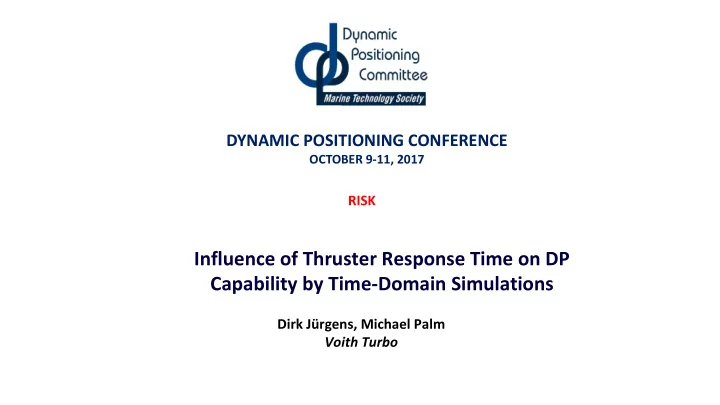

DYNAMIC POSITIONING CONFERENCE OCTOBER 9‐11, 2017 RISK Influence of Thruster Response Time on DP Capability by Time-Domain Simulations Dirk Jürgens, Michael Palm Voith Turbo
Influence of Thruster Response Time on DP Capability by Time-Domain Simulations Dirk Jürgens, Michael Palm - Voith Turbo, Heidenheim, Germany DP Conference Houston 2017
Voith Schneider Propeller
Thruster concepts 15s 2s 2s
Voith Roll Stabilisation (VRS) M wave - Exciting wave moment VSP Thrust M VSP - Stabilizing Moment by the VSP
Voith Roll Stabilisation H s = 4.0m vessel speed = 9kn
Evaluation of DP capability static capability plots environment from wind speed environmental forces X environmental yaw moment
Intact wind envelope for azimuth and VSP static analysis
Evaluation of DP capability neglected effects in static DP plots • vessel is at rest • no dynamic loads from environment • only dependent on BP, not on response time
Motivation • Determine the differences between static and dynamic capability plots • Quantify the benefits in DP by means of a highly responsive propulsor time domain DP simulations at
Simulation approach
Environment data wind-wave relationship based on DNV rules current speed: 0.9m/s (1.75kn) all collinear
Dynamic DP simulation heading limit h=2.5° environmental forces position limit R=1m
Vessel configuration Service Operation Vessel Length 80m Breadth 18m Draught 6m Displacement 6500t Propulsion aft: 2 VSP28/234 P=1850kW BP =255kN 2 Azimuth Thruster CPP D=2.4m, Azimuth speed 3rpm P=1500kW BP =258kN Propulsion bow: 2 tunnel thruster D=2.2m 1200kW and 1 Azimuth Thruster CPP D=1.6m 850kW
Intact wind envelope for azimuth and VSP static analysis
Intact wind envelope for azimuth and VSP static and dynamic analysis
Visualization of transient DP simulations
Wind envelope for azimuth and VSP dynamic analysis ∆ V w of 3m/s ≈ ∆ H s =1m
Static vs. dynamic simulation approach ∆ V w of 3m/s ≈ ∆ H s =1m
Foot print based on dynamic DP runs 18m/s wind, stern on Azimuth VSP
Wind envelope for varying azimuth speed 3rpm 2rpm ∆ V w of 3m/s ≈ ∆ H s =1m
Fuel consumption during DP per thruster configuration three encounter angles have been considered. (0° - bow on, 180° - stern on, 240° - stern quartering) each configuration experiences exactly the same time history of environmental forces corresponding to a mean wind speed of 13m/s
Wind envelope for relaxed VSP controller parameter ∆ V w of 3m/s ≈ ∆ H s =1m
Fuel consumption during DP relative comparison
Dynamic effects during DP transient effects on vessel configuration (failure consequences) X X Courtesy of DNV Marine Cybernetics
Wind envelope – WCSF conditions loss of one aft thruster and one tunnel thruster H s =7.3m H s =5.6m H s =4.1m X H s =2.6m X H s =1.4m
Transient excursion during WCSF loss of one aft thruster and one tunnel thruster WCSF all thrusters intact loss of two thrusters high transient excursion of azimuth configuration (beyond acceptance limit of 1m) after thruster loss due to reallocation of thrust safety-relevant when occuring during transfer of personnel
Statistical analysis of vessel movements movement of vessel ever approached Brent fields in the period of Oct. 2014 – Oct. 2016
VSP vessels servicing the Brent fields
VSP vessels servicing the Brent fields
VSP vessels servicing the Brent fields
VSP vessels servicing the Brent fields PSV «Edda Frende» Brent fields – North Sea 06.09.2015 Deck load operations VRS on H s 3,2m – H max 5-6m – Wind 30 kn Weather direction 90° - 135°
Additional vessel servicing the Brent platforms
distribution of sign. wave height data source:
Sign. wave height in the area
Time in DP at platform for different wave heights
Conclusions • static DP plots do not represent DP capability of a vessel properly • dynamic DP plots provide a much more realistic evaluation of DP capability • response time of thrusters has a major impact on DP capability
Thanks for your attention!
Recommend
More recommend